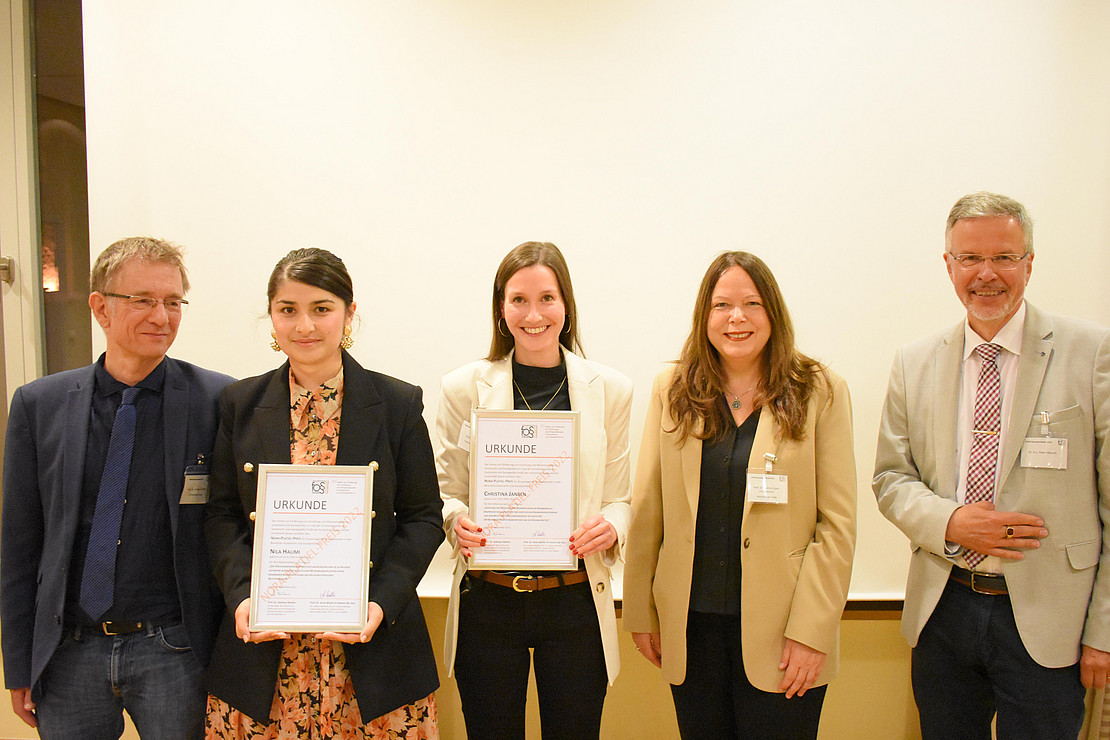This page contains automatically translated content.
Outstanding theses on social law and social policy honored
 Image: FoSS
Image: FoSS"One of the goals we have set ourselves as a sponsoring association is to promote young scientists," emphasized Professor Dr. Gamze Güzel-Freudenstein, deputy chairwoman of the association, at the award ceremony. "Nora-Platiel's lifetime achievement serves as a role model for young scientists."
The two award-winning papers are characterized by a high degree of practical relevance. The former president of the Federal Social Court, Dr. h.c. Peter Masuch, emphasized in his laudation: "Both authors mobilize constitutional and international law, respectively, to improve the living situation of people with a migration background as well as the living situation of people with disabilities."
The awards were presented at an event at the Fulda Transfer University Center.
People without the right to stay: reduction of social benefits constitutional?
Nila Halimi provided a contribution on German migration social law. As a child of Afghan migrants in Germany, she has experienced how important social rights can be for minorities, especially for foreigners, with a view to sustainable integration. She examined the question of whether the sanction system of the Asylum Seekers' Benefits Act complies with the constitutional framework. The Asylum Seekers' Benefits Act provides that foreigners who are obliged to leave the country have their subsistence benefits reduced to a physical subsistence level if they do not cooperate in the repatriation to their country of origin. This includes, for example, assistance in obtaining a passport. The sanctioning of behavior under the law on benefits is intended to help enforce the obligation to leave the country.
Taking into account the case law of the highest courts, Nila Halimi concludes that the sanction system of the Asylum Seekers' Benefits Act violates the fundamental right to be guaranteed a subsistence minimum in human dignity. The sanction standard is unconstitutional. A reduction of 53 percent of the standard rate does not allow for a dignified life. Obligations under the law of residence must also be enforced with instruments under the law of residence. The law on social benefits must not be misused to remedy any deficits in the enforcement of obligations to leave the country.
to remedy deficiencies in the enforcement of obligations to leave the country. Human dignity should not be relativized in terms of migration policy. Legislators must take urgent action to ensure the necessary needs to maintain a dignified existence for the groups of migrants covered by the sanctions standard.
People with disabilities: Entitlement to assistance in the hospital?
Christina Janßen explored the question of whether people with disabilities have a right to assistance in hospital. Especially for people with intellectual and multiple disabilities, it can be crucial to have a familiar caregiver by their side during hospital stays. But funding has been unclear. In 2020, for example, a young woman with a disability submitted a petition to the German Bundestag. A hospital stay that was necessary for her had been delayed because neither the provider of integration assistance nor the health insurance company felt responsible for financing the necessary assistance in the hospital.
The award winner examined the law of statutory health insurance and integration assistance against the background of the UN Convention on the Rights of Persons with Disabilities and the Basic Law. Although there is no explicit legal entitlement to assistance in hospital in the law on integration assistance, these services are included in the benefits for social participation under Social Code IX according to an interpretation that is consistent with the constitution and international law. In particular, it is important to comprehensively determine the needs and to draw up appropriate contracts between the providers of integration assistance and the service providers.
In the meantime, regulations have been introduced to accompany people with disabilities to hospital. According to Social Code V, close relatives and persons from the closest personal environment of the person with disabilities will be entitled to sick pay from November 1, 2022, if they incur a loss of earnings as a result of the accompaniment. An explicit entitlement basis for supportive services during a hospital stay will also be included in the catalog of social participation benefits as of November 1, 2022. However, Christina Janßen is critical of these new regulations. Only people with disabilities who already receive benefits from integration assistance in everyday life are entitled to the benefits. People with dementia, for example, who often only receive care services, remain excluded. Their relatives cannot even receive the new sickness benefit under Social Code V. Against the background of the prohibition of discrimination under Article 3 of the Basic Law and against the background of the UN Convention on the Rights of Persons with Disabilities, this is problematic.
The Research Network for Social Law and Social Policy (FoSS)
In the research association FoSS, the University of Applied Sciences Fulda and the University of Kassel cooperate with the aim of promoting research, teaching and knowledge transfer in the fields of social law and social policy. By linking legal and social science perspectives, the network has a unique position in current social law and social policy research . The network is supported by the Association for the Promotion of Research and Knowledge Transfer in Social Law and Social Policy (Verein zur Förderung von Forschung und Wissenstransfer in Sozialrecht und Sozialpolitik e.V.), which was founded in early 2013. Its members include personalities and institutions from the practice of social law and social policy in North Hesse. The association promotes the intensification and consolidation of the exchange between science and social law and social policy practice.